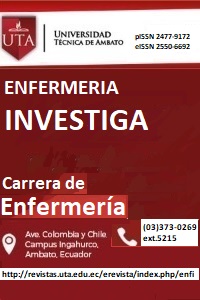PANDEMIC BY COVID-19, A VIEW FROM THE ANDEAN COSMOVISION IN THE SHUAR COMMUNITY
Contenido principal del artículo
Resumen
Introduction: The COVID-19 pandemic has generated a severe global economic, social and health crisis. In some communities, aspects such as habitat and behavior patterns influence the perspectives, experiences and experiences of their inhabitants regarding the management of the disease. Objective: Characterize the COVID-19 pandemic from the Andean worldview of the Shuar community of the Los Encuentros parish. Methods: Qualitative study with phenomenological design, in which 10 informants participated. A semi-structured interview was used to collect data, consisting of 15 questions, which allow three categories to be encompassed: Perception of the COVID-19 disease, the community's experiences in the face of the pandemic and the practices of traditional medicine applied. Results: Most of the participants express that the disease comes from the air, is transmissible and can cause death. Likewise, they considered the biosafety and vaccination measures contemplated by the Ministry of Health to be positive and adequate. As for the experiences, to prevent contagion, they used access restriction to their territories. They identified the sick people, due to characteristic manifestations of the disease, cared for at home and in case of death they proceeded to bury them immediately, without performing farewell rituals for their relatives, generating annoyance among members of the community. For ancestral practices in the treatment, medicinal plants such as eucalyptus, ginger, lemon and orange were used. Conclusions: The ancestral knowledge and practices of the Shuar community allowed them to face the COVID-19 pandemic from their beliefs and culture, but incorporating provisions of the national health authority, which allowed better control of the disease in the community
Descargas
Detalles del artículo

Esta obra está bajo una licencia internacional Creative Commons Atribución-NoComercial 4.0.
Citas
Maguiña Vargas C, Gastelo Acosta R, Tequen Bernilla A. El nuevo Coronavirus y la pandemia del Covid-19. Rev Medica Hered. 2020;31(2):125–131. Disponible en: https://doi.org/10.20453/rmh.v31i2.3776
Díaz-Castrillón FJ, Toro-Montoya AI. SARS-CoV-2/COVID-19: el virus, la enfermedad y la pandemia. Med Lab. 2020;24(3):183–205. Disponible en: http://bitly.ws/x5Eg
Pérez Abrue MR, Gómez Tejeda JJ, Dieguez Guach RA. Características clínico-epidemiológicas de la COVID-19. Rev Habanera Ciencias Médicas. 2020;19(2):1–15. Disponible en: http://bitly.ws/ebWt
Organización Mundial de la Salud (OMS). Tablero de la OMS sobre el coronavirus (COVID-19). 2022. Disponible en: https://covid19.who.int/?mapFilter=cases
Fondo para el desarrollo de los pueblos indígenas de América Latina y el Caribe [FILAC], Foro Indígena del Abya Yala [FIAY]. Buenas prácticas de los Pueblos Indígenas ante la pandemia: Comunidades resilientes. 2020. Disponible en: http://bitly.ws/wGje
Organización de las Naciones Unidas [ONU]. Los Pueblos Indígenas y la COVID-19. 2020. Disponible en: http://bitly.ws/wdGs
Núñez J. Saberes ancestrales de la comunidad Shuar del recinto rio Limón. Tesis de grado, Universidad Politecnica Salesiana; 2017. Disponible en: http://bitly.ws/AVfP
Lucero L, Moreno P. División del Trabajo a través del género en la Cultura Shuar de la Provincia de Morona Santiago. Tesis de grado, Universidad de Cuenca; 2010. Disponible en: http://bitly.ws/AVfA
Cruz Pérez MA. Cosmovisión andina e interculturalidad: una mirada al desarrollo sostenible desde el sumak kawsay. Rev Chakiñan Ciencias Soc y Humanidades. 2018;(5):119–132. Disponible en: http://bitly.ws/wtEx
Paredes Martín M del C. Percepción y atención: Una aproximación fenomenológica. Rev filos. 2012;14:79–92. Disponible en: http://bitly.ws/zwAo
Villanueva Barreto JJ. La percepción como experiencia subjetiva en la constitución del mundo de la vida en la fenomenología de Husserl. Rev da Abordagem Gestaltica. 2020;26:394–407. Disponible en: http://bitly.ws/zwAs
Expósito Concepción MY, Villarreal Cantillo E, Palmet Jiménez MM, Borja González JB, Segura Barrios IM, Sánchez Arzuza FE. La fenomenología, un método para el estudio del cuidado humanizado. Rev Cubana Enferm. 2019;35(1):1–11. Disponible en: http://bitly.ws/zwwv
Guerrero-Castañeda RF, Menezes TM de O, Prado ML do. La fenomenología en investigación de enfermería: reflexión en la hermenéutica de Heidegger. Esc Anna Nery. 2019;23(4):1–7. Disponible en: http://bitly.ws/zwwc
Castillo Sanguino N. Fenomenología como método de investigación cualitativa: preguntas desde la practica investigativa. Rev Latinoam Metodol la Investig Soc. 2021;20(10):7–18. Disponible en: http://bitly.ws/ykFI
Gobierno Autónomo Descentralizado parroquial rural Los Encuentros. Actualización del plan de desarrollo y ordenamiento territorial del gobierno autónomo decentralizado parroquial rural Los Encuentros 2019-2023. 2019. Disponible en: http://bitly.ws/xv93
Tong A, Sainsbury P, Craig J. Consolidated criteria for reporting qualitative research (COREQ): a 32-item checklist for interviews and focus groups. Int J Qual Heal Care. 2007;19(6):349–357. Disponible en: http://bitly.ws/znYF
Barrios Osuna DI, Vivianne D, Escobar A, Morera Pérez M. Declaración de Helsinki: cambios y exégesis Helsinki Declaration: changes and interpretation. Rev Cuba Salud Pública. 2016;42(1):132–142. Disponible en: http://scielo.sld.cu
Reyes Gómez L. Percepción de la covid-19 entre la población indígena zoque de Chiapas. Rev Pueblos y Front Digit. 2021;16:1–23. DOI: https://doi.org/10.22201/cimsur.18704115e.2021.v16.523
Flores Choque GM, Maraza Vilcanqui B, Maraza Nain V, Maraza Vilcanqui Q. Calidad de vida y salud en pueblos indígenas amazónicos durante la pandemia COVID-19. Rev Investig en Salud. 2022;5(14):325–336. Disponible en: http://bitly.ws/x5EL
Malán Lema JC. Conocimientos y saberes ancestrales de los YACHAY de la parroquia Pungalá ante la pandemia ocasionada por la Covid-19. Tesis de grado, Universidad Nacional de Chimborozo; 2022. Disponible en: http://bitly.ws/vDs7
Castrillo Guzmán A, Duarte Dávila A, Blass Alfaro G. Vista de Percepción de la vacuna contra la COVID-19: Un estudio comunitario en Managua. Rev ciencias la salud y Educ médica. 2022;4(5):8–15. Disponible en: http://bitly.ws/zhEp
Tuaza Castro LA. El COVID-19 en las comunidades indígenas de Chimborazo, Ecuador. Lat Am Caribb Ethn Stud. 2020;15(4):413–424. Disponible en: https://doi.org/10.1080/17442222.2020.1829793
Chicaiza Calapaqui MD. Uso de la medicina ancestral frente al Covid-19, comunidad indígena la joya del cantón Otavalo 2021. Tesis de posgrado, Universidad Técnica del Norte; 2021. Disponible en: http://bitly.ws/vDru


